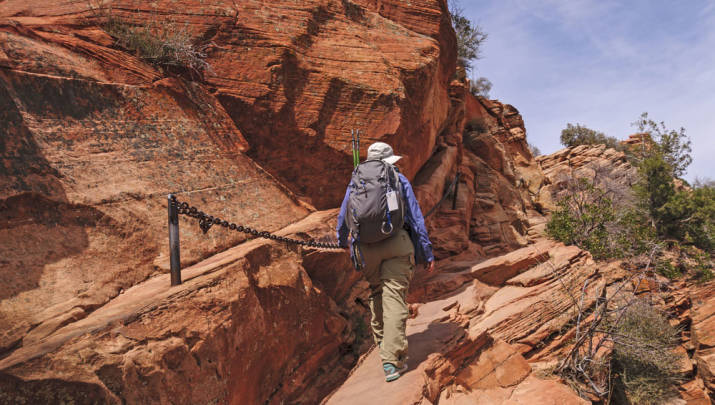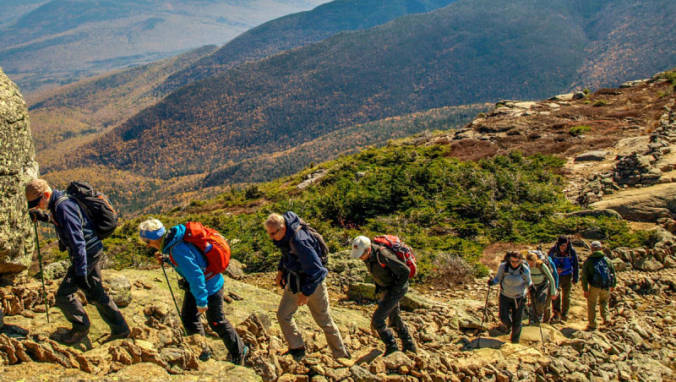
How to Prepare for Your First Walking Holiday
Fresh air, the great outdoors, a sense of real adventure a walking holiday is a truly wonderful thing. And with Bill Bryson’s tale of Appalachian Trial hitting the big screen, more of us than ever are likely to be inspired to take the plunge but its a good idea to do a bit more preparation than Bill!
Indeed, one of the reasons that walking holidays are so rewarding is that they are challenging, so you really get a sense of having achieved something. Of course, to make this challenging aspect enjoyable rather than uncomfortable, you need to improve your fitness before you travel. This guide will help you get to grips with the best ways to prepare, from understanding what level of fitness you need to achieve, to how you can make it easier on yourself (without taking away the challenge!).

Landscapes in the USA, such as the aforementioned Appalachian Trail, are some of the best in the world for hiking, so there’s more than a little to be said for following in Mr Bryson’s footsteps.
Know how fit you need to be
Before you begin spending hours at the gym, make sure you understand how fit you actually need to be. When it’s your first hiking holiday, this is best done simply by talking to the company you will be travelling with. They will have plenty of experience of hiking in your chosen destination and therefore will be able to give you plenty of advice.
Walks and hikes will usually range from easy to moderate and up to strenuous, and each will require a different level of fitness and ability. Whatever level you choose you are more likely to enjoy your experience more if you have a good level of physical fitness and some hiking experience before you travel (don’t fret if you don’t have the latter when you book you will acquire hiking experience while you are improving your fitness). Also, understand approximately how far you will be hiking each day, and the elevation of the walks this will give you a useful measure to be able to test yourself against.
How to get fit for your hiking holiday
You should begin a regular exercise regime a minimum of three months before you travel (although the sooner the better) and aim for good overall fitness, not just competent hiking.
- Talk to your doctor
The first step is to have a quick chat with your doctor. That’s technically what we should all do before starting any new exercise regime, though most of us don’t! This will not only ensure that said regime will do you know harm, but can also help you to start off at the right level and improve gradually. And of course, if you have any medical issues, you can find out how to manage these during your training.
- Understand what you need to improve
Next, understand what exactly you need to improve so you can exercise appropriately. Of course, with hiking the leg muscles are essential, but you also need to improve strength around your hips and shoulders to make sure carrying a bag for long periods isn’t uncomfortable, and work on your core as well.
- Start slow and understand your limits
Never underestimate the value of pacing yourself. When training for a hike, particularly a challenging one, it’s tempting to do as much as possible as often as possible. Frequently, this does more harm than good especially in the beginning, when your body really needs time to acclimatise to its new activity levels. Rest between training sessions is also important, as this is when your muscles repair and get stronger.
Depending on your current fitness levels, it’s best, to begin with just 30 minutes of exercise three times a week. Walking is a natural place to start, but feel free to incorporate other activities such as swimming or running cross-training allows you to develop other muscles and improve your overall fitness.
With walking, you can increase the amount of time you are walking relatively quickly as long as your muscles aren’t too sore from 15 minutes on the first day, for example, to 60 minutes on the 12th day. Just make sure you increase the time gradually and have a day off every 2 to 3 days.
- Train with a friend

You’re more likely to succeed with your training if you enjoy it, so vary where you are walking to make things more interesting and, if you can, train with a friend. Not only will this make your exercise more fun, but it will add an extra dose of motivation to stick to your regime.
- Take long walks once a week
Of course, if you are tackling a strenuous hike, something like the Appalachian Trail where you are likely to walk up to 8 miles a day, you need to be used to longer exercise sessions. That’s why you should incorporate one long walk into your weekly schedule the weekend is best for this, as these range from 90 minutes to several hours long. It’s important not to aim for speed here increase, go at a steady, manageable pace that you can maintain.
- Carry weight
Most people will carry a backpack when they’re hiking, even if it’s only a relatively light one stocked with essentials like water. To make sure your shoulders and hips can cope with the weight you will be carrying on your trip, you need to practise hiking with a load. However, as with every aspect of training, you need to start slow.
Carrying just water and a first aid kit is a good way to start, as those are essentials you’ll need on long walks anyway. Then, when you are fitter (happily hiking 3 miles in an hour for example) then you can start adding a little more weight, gradually increasing it until you reach your expected weight for the trip. This will make sure your shoulders and hips are ready to take the strain.
- Core and muscle exercises
As well as hiking and other forms of cardiovascular exercise, it is worth doing simple muscle exercises to increase your strength particularly in your core, which will help improve your balance and posture. Lunges and squats are ideal for boosting leg strength, while planks are a simple and effective way to strengthen your core. As a bonus, all of these exercises take very little time and can be done at home.
How to make it easier
Going on your first walking holiday can be a little intimidating, from concerns about whether you’ll be fit enough in time to worries about losing your way. While going on a group walking holiday cant take care of the fitness element for you, it can take the pressure off almost everything else. For example, experienced guides will make sure you don’t lose your way (and can tell you lots of interesting facts about the terrain as you go), and will be there to provide help on the off-chance you need any.